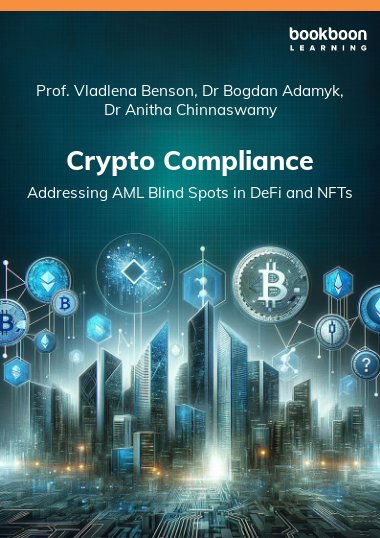The financial regulatory landscape has failed to maintain pace with the exponential proliferation of DeFi and NFTs. This book explores the profound influence of DeFi and NFTs on the financial world, investigating the impact of cryptocurrency on Anti-Money Laundering (AML) operations.
The book explores the current regulatory landscape, including the challenges regulators and stakeholders face in implementing effective AML measures in the UK’s cryptocurrency and blockchain regulatory environment. It also examines DeFi and NFTs' unique features and their specific challenges for AML regulation.
About the Authors
Dr Vladlena Benson, Professor of Cyber Security Management, directs the Cyber Security Innovation Centre at Aston University. Her research focuses primarily on secure FinTech exploitation, cyber security risk management and privacy-enhancing technologies, published by world-leading journals. Alongside her academic role, Vladlena works with multiple organisations and governments, moulding future national policy within Cyber Security, Standards and Partnerships. This includes membership of the UK Cyber Security Council (UK-CSC) and Information Systems Audit and Control Association (ISACA), serving on the European Union Agency for Cybersecurity (ENISA) task force defining the criteria for European Cybersecurity Framework at the EU level.
Dr Bogdan Adamyk is an experienced researcher who has published in top-rated academic journals and edited volumes. His publications enjoy high popularity as he specialises in banking regulation and cryptocurrency. Bogdan works on the Horizon-funded project TRACE - AI in countering financial crime and tracing illicit money flows at Aston Business School. His current research interests lie in the area of AI regulation, cryptocurrencies, and blockchain applications in finance.
Dr Anitha Chinnaswamy delivered many research and consultancy projects aimed at supporting the cybersecurity sector, alongside working with stakeholders in the key areas of cybersecurity risk management, awareness and organisational training and development in cybersecurity. In delivering the initiatives Anitha also holds relationships with regional cybercrime units, cyber resilience centres and academic partnerships. Dr Chinnaswamy has recently completed the UK cyber security ecosystem mapping project which generated a database of public and private growth initiatives in cybersecurity. Anitha’s research has been recognised by the leading journals, including Technovation, Technological Forecasting and Social Change, and the European Journal of Law and Economics.
